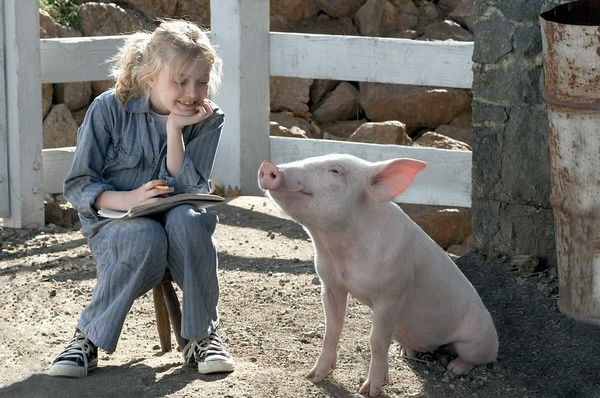當(dāng)前位置: Language Tips> 名著選讀

On Sunday morning Mr. and Mrs. Arable and Fern were sitting at breakfast in the kitchen. Avery had finished and was upstairs looking for his slingshot.
星期六早上,阿拉貝爾先生和太太還有芬正坐在廚房吃早餐。埃弗里已經(jīng)吃過(guò)了飯,便上樓找他的彈弓去了。
"Did you know that Uncle Homer's goslings had hatched?" asked Fern.
“你們知道霍默舅舅的小鵝孵出來(lái)了嗎?”芬問(wèn)。
"How many?" asked Mr. Arable.
“孵出了多少個(gè)?”阿拉貝爾先生問(wèn)。
"Seven," replied Fern. "There were eight eggs but one egg didn't hatch and the goose told Templeton she didn't want it any more, so he took it away."
“七個(gè)。”芬回答。“本來(lái)有八個(gè)蛋,但有一個(gè)沒(méi)孵出來(lái)。母鵝告訴坦普爾曼她不想要這個(gè)蛋了,所以他把蛋帶走了。”
"The goose did what?" asked Mrs. Arable, gazing at her daughter with a queer, worried look.
“母鵝說(shuō)什么了?”阿拉貝爾太太驚奇而又擔(dān)心地盯著女兒?jiǎn)枴?/p>
"Told Templeton she didn't want the egg any more," repeated Fern.
“她告訴坦普爾曼,她不想再要那個(gè)蛋了,”芬重復(fù)道。
"Who is Templeton?" asked Mrs. Arable.
“誰(shuí)是坦普爾曼?”阿拉貝爾太太問(wèn)。
"He's the rat," replied Fern. "None of us like him much."
“他就是那只老鼠,”芬回答。“我們都不太喜歡他。”
"Who is 'us'?" asked Mr. Arable.
“誰(shuí)是‘我們’?”阿拉貝爾先生問(wèn)。
"Oh, everybody in the barn cellar. Wilbur and the sheep and the lambs and the goose and the gander and the goslings and Charlotte and me."
“噢,就是住在谷倉(cāng)地窖里的所有人。威伯,綿羊,羊羔,母鵝,公鵝,小鵝,夏洛和我。”
"Charlotte?" said Mrs. Arable. "Who's Charlotte?"
“夏洛?”阿拉貝爾太太說(shuō)。“誰(shuí)是夏洛?”
"She's Wilbur's best friend. She's terribly clever."
“她是威伯最好的朋友,她非常的聰明。”
"What does she look like?" asked Mrs. Arable.
“她長(zhǎng)得什么樣兒?”阿拉貝爾太太問(wèn)。
"Well-l," said Fern, thoughtfully, "she has eight legs. All spiders do, I guess."
“嗯,”芬仔細(xì)想了想,說(shuō),“她有八條腿。所有的蜘蛛都如此,我猜。”
"Charlotte is a spider?" asked Fern's mother.
“夏洛是一只蜘蛛?”芬的母親問(wèn)。
Fern nodded. "A big grey one. She has a web across the top of Wilbur's doorway. She catches flies and sucks their blood. Wilbur adores her."
芬點(diǎn)點(diǎn)頭:“一只很大的灰蜘蛛。她在威伯的門(mén)口上方織了一張網(wǎng)。她能抓蒼蠅,還吸他們的血。威伯可崇拜她了。”
"Does he really?" said Mrs. Arable, rather vaguely. She was staring at Fern with a worried expression on her face.
“他真的崇拜她?”阿拉貝爾太太幾乎聽(tīng)糊涂了。她用一種擔(dān)憂的表情盯著芬的臉。
"Oh, yes, Wilbur adores Charlotte," said Fern. "Do you know what Charlotte said when the goslings hatched?"
“噢,是的,威伯崇拜夏洛。”芬說(shuō),“你知道當(dāng)小鵝出世時(shí)夏洛說(shuō)什么了?”
"I haven't the faintest idea," said Mr. Arable. "Tell us."
“我可什么都不知道,”阿拉貝爾先生說(shuō),“跟我們講講。”
"Well, when the first gosling stuck its little head out from under the goose, I was sitting on my stool in the corner and Charlotte was on her web. She made a speech. She said: 'I am sure that every one of us here in the barn cellar will be gratified to learn that after four weeks of unremitting effort and patience on the part of the goose, she now has something to show for it.' Don't you think that was a pleasant thing for her to say?"
“好吧。當(dāng)?shù)谝恢恍※Z從鵝媽媽的身下伸出他的小腦袋時(shí),我正在旁邊的凳子上坐著,夏洛就在她的網(wǎng)上掛著。她發(fā)表了一場(chǎng)演說(shuō)。她說(shuō):‘我們?cè)诠葌}(cāng)地窖里的每一位都將高興地獲悉,經(jīng)過(guò)四周的不懈努力與耐心的等待,我們的朋友母鵝終于取得了驕人的成績(jī)。’你不認(rèn)為她說(shuō)的是件大喜事嗎?”
"Yes, I do," said Mrs. Arable. "And now, Fern, it's time to get ready for Sunday School And tell Avery to get ready. And this afternoon you can tell me more about what goes on in Uncle Homer's barn. Aren't you spending quite a lot of time there? You go there almost every afternoon, don't you?"
“是的,我承認(rèn),”阿拉貝爾太太說(shuō)。“現(xiàn)在,芬,該到上主日學(xué)校的時(shí)間了。告訴埃弗里做好準(zhǔn)備。今天下午你可以把你霍默舅舅谷倉(cāng)里的事兒再告訴我們一些。你在那里花了不少時(shí)間吧?你幾乎每天下午都去,是不是?”
"I like it there," replied Fern. She wiped her mouth and ran upstairs. After she had left the room, Mrs. Arable spoke in a low voice to her husband.
“我喜歡那兒,”芬回答。她擦擦嘴巴跑上了樓。她離開(kāi)房間后,阿拉貝爾太太和她丈夫低聲交談起來(lái)。
"I worry about Fern," she said. "Did you hear the way she rambled on about the animals, pretending that they talked?"
“我為芬擔(dān)心,”她說(shuō),“你聽(tīng)見(jiàn)她是怎么信口開(kāi)河地說(shuō)那些動(dòng)物的嗎,好像他們會(huì)說(shuō)話一樣?”
Mr. Arable chuckled. "Maybe they do talk," he said. "I've sometimes wondered. At any rate, don't worry about Fern--she's just got a lively imagination. Kids think they hear all sorts of things."
阿拉貝爾先生微笑了。“可能他們真會(huì)說(shuō)話吧,”他說(shuō),“我有時(shí)也覺(jué)得這很奇怪。不管怎樣,不必?fù)?dān)心芬——她不過(guò)是有生動(dòng)的想象力罷了。小孩子認(rèn)為他們什么都能聽(tīng)到。”
"Just the same, I do worry about her," replied Mrs. Arable. "I think I shall ask Dr. Dorian about her the next time I see him. He loves Fern almost as much as we do, and I want him to know how queerly she is acting about that pig and everything. I don't think it's normal. You know perfectly well animals don't talk."
“雖然如此,我還是擔(dān)心她,”阿拉貝爾太太回答。“我想我下次看到多里安醫(yī)生時(shí),該對(duì)他談?wù)劮业氖聝骸K麕缀跸裎覀円粯拥膼?ài)芬,我要問(wèn)問(wèn)他,芬自以為能聽(tīng)懂豬和別的動(dòng)物的談話,這是不是很奇怪。我不認(rèn)為這是正常的。你完全知道動(dòng)物們根本不會(huì)說(shuō)話的。”
Mr. Arable grinned. "Maybe our ears aren't as sharp as Fern's," he said.
阿拉貝爾先生咧開(kāi)嘴笑起來(lái)。“可能我們的耳朵不像芬那么尖吧,”他說(shuō)。
(來(lái)源:愛(ài)思英語(yǔ) 編輯:丹妮)
上一篇 : 暖心小說(shuō)《小王子》第22章
下一篇 : 暖心小說(shuō)《小王子》第23章
關(guān)注和訂閱


口語(yǔ)
關(guān)于我們 | 聯(lián)系方式 | 招聘信息